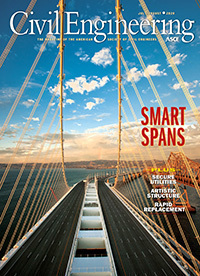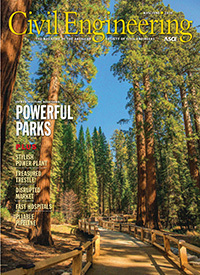Engineers and public health

WELL DONE to T.R. Witcher on the History Lesson article “Collaboration among Professionals: The Role of Civil Engineers in Public Health” (July/August 2020, pages 38–41). It was timely and well written while tackling a difficult topic.
JOEL A. JONES, P.E., M.ASCE Lakewood, Colorado
I APPRECIATED the History Lesson article “Collaboration among Professionals: The Role of Civil Engineers in Public Health.” I read History Lesson along with A Question of Ethics and The Law in every issue of Civil Engineering.
I am a licensed water resources civil engineer with almost 40 years of experience in engineering for a wholesale water agency, and I belong to the American Water Works Association as well. So I was familiar with some parts of the article, but I also learned a great deal.
There is one aspect of the story regarding the Flint, Michigan, water crisis that could have used some additional discussion. The text at the bottom of page 40 and top of page 41 quotes Cdr. Richard J. Gelting, Ph.D., P.E., a program director with the Division of Global Health Protection at the U.S. Centers for Disease Control and Prevention, saying that what was needed was “the expertise to say, ‘No, you shouldn’t take a different source of water and run it through the same system without at least considering the effects it would have on the piping and other infrastructure elements.’ That was never even raised. … And it’s not that complicated. I’m not trying to belittle the problem at all, but I think that if there was an engineering perspective more involved in that decision-making, there would at least be someone saying, ‘Wait a minute, let’s think about this.’ And that just simply did not happen.”
It’s pretty clear to me that those involved were making decisions on the basis of cost and schedule and not on public safety and that there was a substantial institutional failing on the part of Flint; its primary water-quality regulator, the Michigan Department of Environmental Quality (MDEQ); and the U.S. Environmental Protection Agency.
It has been reported that there was, in fact, discussion of this issue by the MDEQ, and that discussion included engineers. The issue was known, and they failed to act. It’s also true that many engineers and water-quality experts in the water business would have known about the source-water change issue. I knew about this issue, and I’m not even a water-quality/watertreatment/corrosion-control expert—just a run-of-the-mill civil engineer in the water business.
I wonder how it was that no engineers working for Flint, either as employees or consultants, came forward.
I wonder how it was that no engineers working for Flint, either as employees or consultants, came forward. I continue to wonder if it was budgetary and/or schedule pressure that led to this breakneck process without proper engineering review of the source-water change or if it was a somewhat knowing refusal to even ask the question.
As a licensed civil engineer in the water business, I feel very strongly that this was an egregious governmental failure and those responsible should serve jail time.
DAVID E. HOOK, P.E., M.ASCE San Jose, California
Complex systems are difficult to predict

I THANK YOU for publishing my letter in the May/June 2020 issue, but in the editing process, I believe its meaning was changed. My letter was in support of the position of Nicholas De Gennaro, Ph.D., P.E., M.ASCE, and explained that our planet is a complex system and therefore no predictions of its future behavior can be made.
We are in the middle of a pandemic, and many are frustrated by the confusing recommendations coming from the experts—renowned scientists working at excellent universities and research centers. For us engineers, it must be particularly annoying that projections of the number of deaths that will result from COVID-19—produced by scientists using scientific models—seem to be wrong, some even by two orders of magnitude. Are these scientists incompetent or corrupt? No, they are simply trying to predict the unpredictable. Obviously, a pandemic is a complex system, and unpredictability is its major feature.
In the same way, our planet is a complex system, and therefore its behavior, including climate change and the relationship between CO2 and temperature, is also unpredictable. In the case of a pandemic, unpredictability can be observed in a short period of several months. However, climate changes occur over thousands of years, and for this reason they are even more difficult to predict. Any predictions are speculation, not science, as it is with the COVID-19 deaths.
TOMASZ ARCISZEWSKI, PH.D., A.M.ASCE Middlebrook, Virginia
Please direct all further discussion of the role that carbon dioxide plays in global warming to ASCE’s Collaborate discussion platform at tinyurl.com/CO2Discussion.—EDS.
These letters first appeared in the September 2020 issue of Civil Engineering.
LETTERS TO THE EDITOR are welcome. They may be sent via email to [email protected] or addressed to “Letters,” Civil Engineering magazine, ASCE, 1801 Alexander Bell Drive, Reston, VA 20191-4382. Letters may be edited for clarity and style, as well as to conform to space constraints. We regret that we cannot publish every letter we receive.
